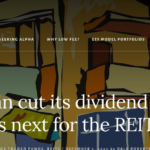
By Dale Roberts, Cutthecrapinvesting
Special to the Financial Independence Hub
What a difference a pandemic makes. And what a difference a few months can make in the REIT sector. Just a few short months ago RioCan CEO Ed Sonshine promised that the distribution was rock solid. But on Friday of this week RioCan cut its dividend by some 33%.
In May of 2020 Mr. Sonshine had offered …
“Either the market has way overreacted on the downside, or there’s this feeling that the world is so awful that they’re all going to be cut … I can assure you that’s not the case for RioCan.”
So much for assurances, and so much for those dividend payments. And ya, the world is kinda awful in 2020 Mr. Sonshine. These are tough days for many REITs with exposure to retail and office space. We are in the midst of the work from home and shop from home and eat at home new normal. Obviously, it was irresponsible and misguided to make any kind of promise in the middle of the first modern day pandemic.
At the time (in May) on BNN Bloomberg the RioCan CEO also offered:
The current yield is “probably the highest we’ve ever traded at in history, and our portfolio is the best it’s ever been in history.”
The REIT announced late Thursday that the monthly distribution will fall to eight cents per unit as of January from the rate of 12 cents, which has been consistent since February 2018.
And the vaccine rollout timetable for Canada also affected the decision to cut the dividend. We might not be getting to the other side of the pandemic as quickly as we might have thought a few weeks ago. Many REITs do need the world order to get back to normal, or let’s say ‘more normal’. Much of 2021 might look a lot like 2020.
However, after Prime Minister Justin Trudeau recently said he expects most Canadians won’t be vaccinated against COVID-19 until September 2021, Sonshine said it made the company realize the year ahead remains uncertain.
BNN Bloomberg
Canada’s best performing REIT ETF has limited exposure.
When I heard the news that RioCan cut its dividend, I immediately thought of the RioCan exposure in the CI First Asset REIT. I wrote that dedicated post in late October. Looking under the hood, that CI First Asset REIT only has some 2.8% exposure to RioCan. Compare that to the index REIT ETFs offered by Vanguard, iShares where you’ll find exposure in the range of 10%. The BMO equal weight REIT has the exposure under 5%, of their 22 holdings. Horizons REIT ETF (HCRE) also mimics the same index as the BMO offering: the Solactive Equal Weight Canadian REIT Index. Those are both wonderful options.
Back to that CI REIT, it has very modest exposure to the retail sector, and what it does own is by way of some solid grocery store anchors. The fund also has very limited exposure to office REITs at 6%. The fund, thanks to its active management and more broad-based portfolio appears to be well positioned for the pandemic and ‘new normal’.
Remember why you own those REITs
Real estate is known as rock solid: these are hard assets. You collect rent. It is not a good time to run away from the sector. Remember why you own those REITs in the first place. You own it for diversification and for the generous dividend payments.
REITs are a wonderful diversifier for those stocks and bonds. It’s another layer for the portfolio.

And here’s a very informative post from Horizons – Finding the right income opportunity in 2020. That post covers why preferred shares an
d REITs can provide some of that desired yin and yang on the diversification front.
And here’s why REITs can benefit when bond yields and rates are low.

Typically, REITs use debt to acquire properties and rent out those properties to generate income, which is distributed to unitholders. Naturally, the biggest hit to revenue is the carry cost of borrowing, so when interest rates are low, the funds from operations (“FFO”) tend to skew higher.
– Horizons
REITs benefit from that low yield environment and from falling rates. Most analysts project that rates and borrowing costs are not going anywhere in a hurry. The concern for many REITs is the pandemic and our shopping and work behaviour. Successful vaccines will likely bring back more of that ‘old normal’ in 2021 or into 2022. We might then be in a more favourable environment for REITs and REIT ETFs.
And remember that REITs have historically delivered very generous returns, outright. Here’s the returns history for the BMO REIT ETF, and the Solactive index.
An incredible total return history.

Those returns trounced that of the TSX Composite.
There might be more value in the core iShares and Vanguard REIT ETFs as more investors turn their backs on the harder hit REITs. And be prepared, there may be more dividend cuts to come. You might get the opportunity (potentially) to buy at even lower prices.
That said, after a few other REITs cut their dividends the share prices went on to out perform the index. This table is courtesy of Mat Litalien of stocktrades.ca. The Absolute Return shows the out performance or under performance relative to the index – from the time of the dividend cut or reduction.

I really like that CI First Asset REIT and the BMO and Horizons offerings that offer the equal-weight option. Investors may also choose to hand select a few REITs. You make look for safety, or value, or combination of. You can also skim (buy) enough of those individual REITs to create your own lower fee “ETF”.
If you sign up with Questrade you will not pay any fees when you purchase ETFs.
If you don’t yet have an allocation to REITs this might be an attractive entry level as prices are still depressed.
You might also consider a Global REIT ETF.
Final thoughts for RioCan
When the REIT reported its most recent quarterly earnings, management said the company collected 93.4 per cent of its billed rent. It added that of all the retailers that had filed for bankruptcy protection, the confirmed closings represented just 0.9 per cent of RioCan’s total revenue.
But at the same time, management had also disclosed they created two categories of tenants across its portfolio, and 22 per cent of its net rent was characterized as “potentially vulnerable.” This group includes movie theatres, gyms and sit-down restaurants.
Thanks for reading, we’ll see you in the comment section.
 Dale Roberts is the Chief Disruptor at cutthecrapinvesting.com. A former ad guy and investment advisor, Dale now helps Canadians say goodbye to paying some of the highest investment fees in the world. This blog originally appeared on Dale’s site on Dec. 5, 2020 and is republished on the Hub with his permission.
Dale Roberts is the Chief Disruptor at cutthecrapinvesting.com. A former ad guy and investment advisor, Dale now helps Canadians say goodbye to paying some of the highest investment fees in the world. This blog originally appeared on Dale’s site on Dec. 5, 2020 and is republished on the Hub with his permission.

